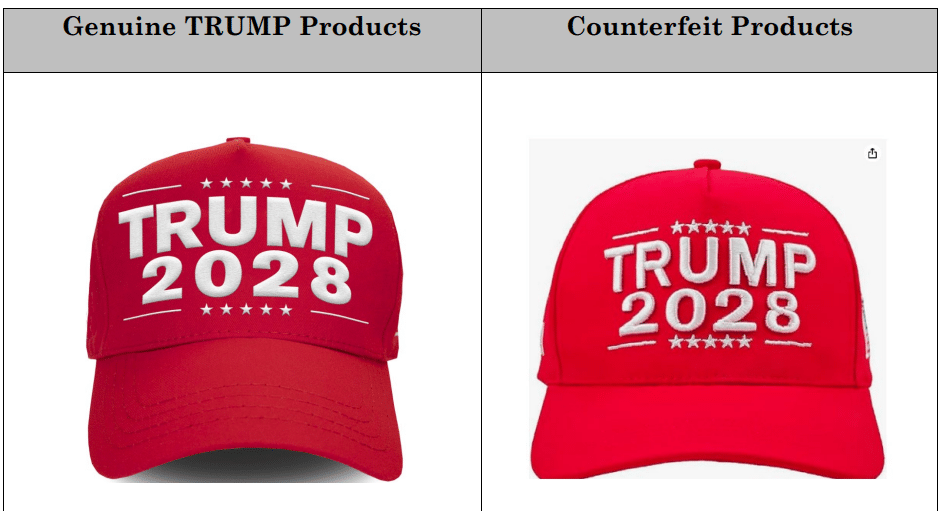The Trump Organization is going after merchants on Amazon, eBay, Walmart and other online marketplaces who are allegedly selling merchandise that infringes on President Donald Trump’s trademarks.
In a lawsuit filed last week, the conglomerate – privately owned by the president – has accused the online sellers of peddling “inferior imitations” of Trump-branded products. The Trump Organization, which sells a plethora of branded merch through its online store, claims the merchants haven’t licensed its trademarks and aren’t authorized resellers of such products.
- The lawsuit cites hats, hoodies, T-shirts and drinkware emblazoned with “Trump” as examples of alleged knockoffs.
- Between April and September of 2024, Amazon sellers made $140 million from Trump-related merchandise, according to software firm Omnisend.
“By selling counterfeit products that purport to be genuine and authorized products using the TRUMP trademarks, defendants cause confusion and deception in the marketplace,” the lawsuit states.

In addition to seeking to prevent online sellers from using Trump trademarks, the company is also asking a judge to force the online marketplaces to destroy the alleged counterfeit merch.
- ACE Specialties, PPAI 100’s No. 56 distributor, has been the official merchandise provider for the Trump campaign since 2015.
Emerging Legal Tactic
However, the lawsuit doesn’t mention which sellers the Trump Organization is going after.
Instead, the defendants are listed as “the individuals, corporations, limited liability companies, partnerships and unincorporated associations identified on Schedule A.”
- Schedule A cases, a “relatively recent legal trend,” allow intellectual property owners to sue numerous online retailers and others who have allegedly infringed upon their rights all at once.
Parties may pursue Schedule A complaints to better ensure an immediate, if even temporary, end of infringing activity and to maintain the status quo of accounts relative to the plaintiff’s claims of infringement, according to Cory Halliburton, an attorney with Freeman Law and general counsel for PPAI.
RELATED: Jury Deems Vintage Brands Guilty Of Infringing On Penn State Trademark
Usually, the Schedule A list of defendants is submitted under seal to the court, Halliburton says, and the judge may issue a temporary restraining order against those defendants without publicly identifying them and without allowing them to know they are a target in the lawsuit.

Cory Halliburton
General Counsel, PPAI
“That is commonly called an ex parte TRO, which, under the Federal Rules of Civil Procedure, may be issued when specific and sworn-to facts clearly show that immediate and irreparable loss or damage will result to the plaintiff should the defendant be notified in advance of the injunctive relief requested,” Halliburton says.
- An ex parte TRO must contain specific details about why the order was issued without notice and must describe the loss or damage and state why it is irreparable, based on the plaintiff’s verified statement of facts.
- An ex parte TRO expires no later than 14 days from its issuance, unless the court, for good cause, extends it for another 14-day period or the defendant party consents to a longer extension.
- Upon a hearing of the TRO, the judge may, in the form of a temporary injunction, extend the orders through the life of the litigation or may dissolve the TRO, depending on the evidence presented at the hearing.
“Another reason to proceed in a Schedule A complaint procedure is to mitigate attorneys’ fees and costs because the plaintiff may be permitted to combine a multitude of similar trademark or intellectual property infringement claims into one judicial proceeding,” Halliburton says.
Promo Perspective
Protecting intellectual property is a major concern for the promotional products industry, which is fueled by creativity and innovation.
- Trademarks, copyrights and patents are designed to distinguish one’s products or services from another’s.
- Those protections enable customers to know what they can expect, ultimately building brand loyalty.
Although the need to protect IP isn’t called into play until someone infringes on it, suppliers, distributors, decorators and business service providers should keep an eye on the market to remain vigilant. For example, suppliers are urged to file a patent application before public disclosure.
ICYMI: L.L.Bean Drops Lawsuit Against 4imprint
“If you wait to file, you may waive your rights or limit the remedies,” said Justin Miller, Esq., a patent attorney with Larson & Larson, at the 2019 PPAI Product Responsibility Summit.
- In a landmark legal victory for the promo industry in 2018, a federal court jury ruled in favor of ETS Express after the supplier was sued for alleged trademark infringement by Can’t Live Without It, LLC, dba S’well Bottle.
Conversely, you don’t want to infringe upon someone else’s IP when creating or designing products. When accepting an order, distributors should avoid the obvious such as Disney, Star Wars, Marvel characters and the like, as well as famous landmarks, slogans, logos, likenesses of celebrities and photos and art of unknown origin.
RELATED: New Ruling Could Make Design Patents Harder To Obtain
“Fair use laws remain extremely gray, and companies incorporating copyrighted assets into their work should be aware that the case-by-case and context-sensitive evaluation lends itself to much subjective speculation about how a court of law, i.e., a judge or a panel of judges, may apply an objective analysis in determining whether a use of a copyrighted work is fair and thus non-infringing,” wrote Halliburton in a 2023 commentary on the Copyright Act’s ‘fair use’ doctrine.


